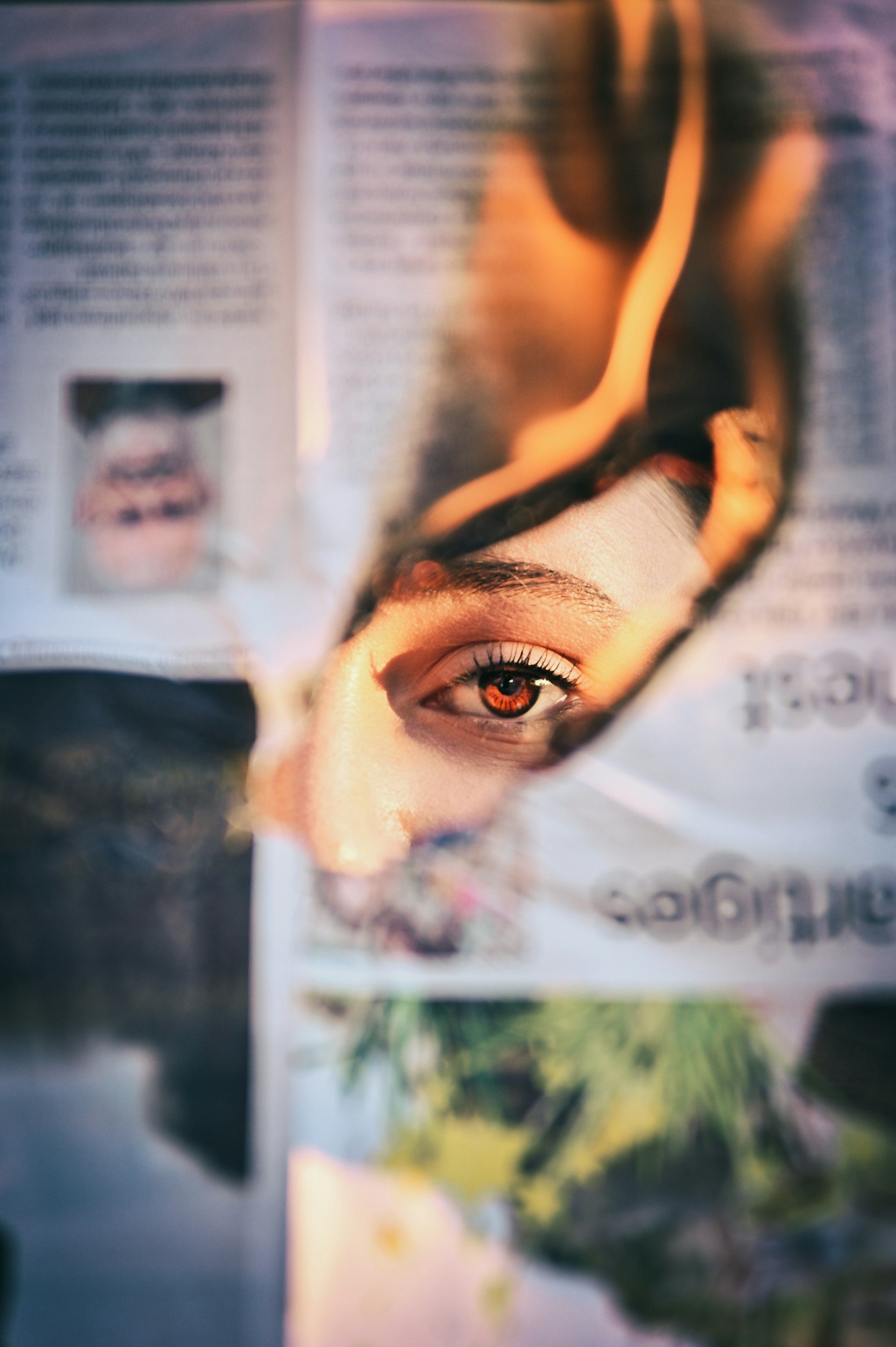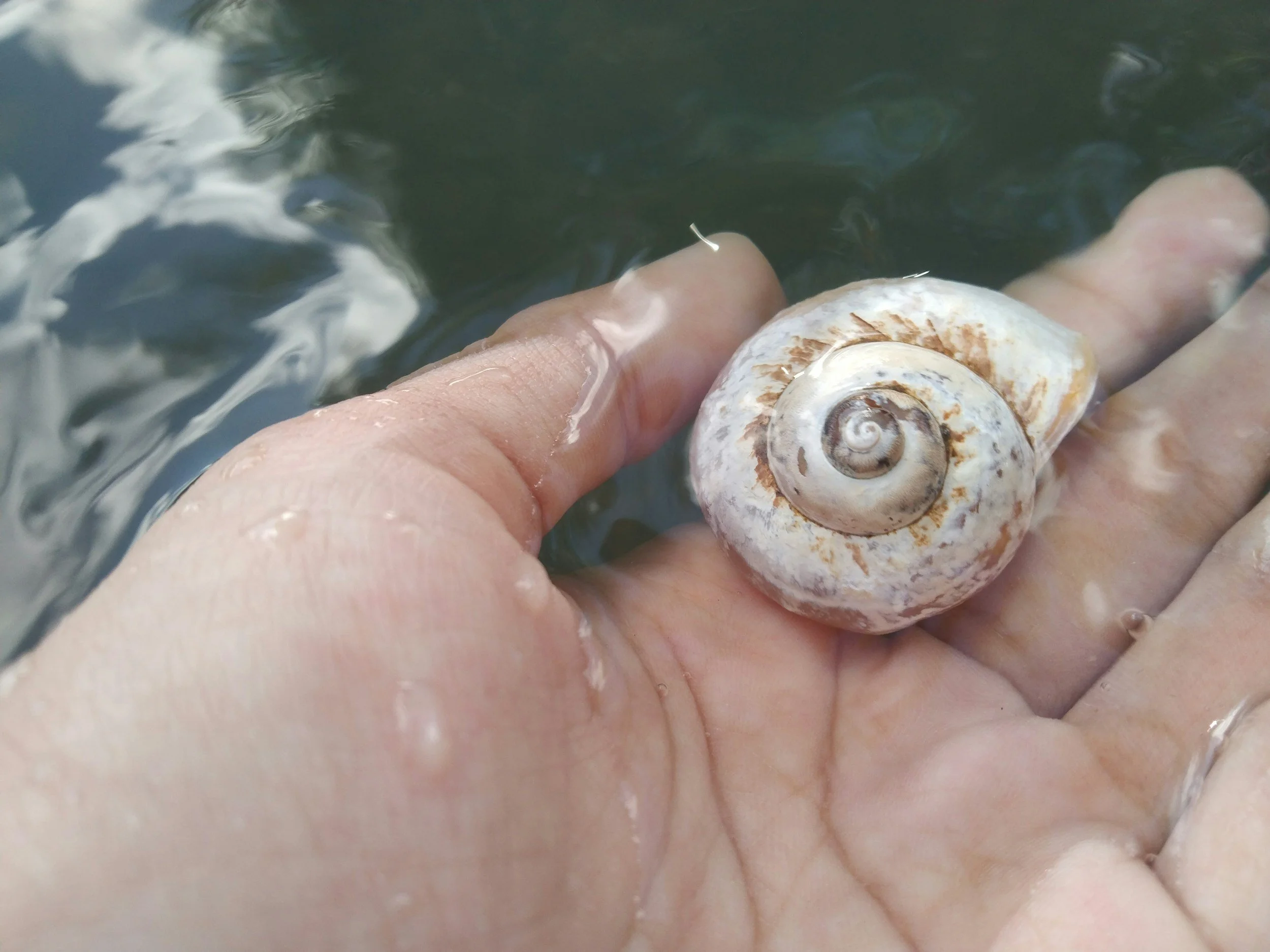Brave Mom
It is the wettest, coldest winter you can have without the gift of any snow. We slog through one rainy day after another. My husband is working late, and I know I will crash into bed before he gets home. That means that only conversations I will have today are with people who call me “mom.” I am swallowed up in momming. As I trudge upstairs with another bowl of cereal, and a towel to clean up the first bowl my son knocked over in anger that it was “too milky”, I recall a time when I didn’t feel like a mom at all.
I was pregnant with my third child, three kids in four years, and sitting on my therapist Erin’s couch. We were exploring a new unnamed part of me—a part that was soft and vulnerable, filled to the brim with love, conviction, and confidence. A part that made me feel grounded.“I am a safe harbor,” it said. “I am home base.” My therapist wondered what I would call this part. I had no idea. “I have no idea who this is," I said. I saw Erin bite her tongue, but I was genuinely stumped. Four months later, I was still not able to give this part a name. Erin quietly, gently slid a suggestion: “Could we call her ‘mom’?” It was a lightning bolt. This was what I felt like as a mom. I had a three-year-old who required enormous support, a one-year-old whose explosions terrified me and whose medical issues required frequent doctor’s visits, and a pregnancy that made me feel constantly sick. I found the whole concept of motherhood strange and foreign.
I had absorbed a definition of “mom” that made me feel like a bumbling outsider. Moms had the wipes in the designated pocket of their diaper bag. They were clear, held consistent boundaries and remained effortlessly calm. Moms knew how to keep their houses tidy and never resented their kids. Moms gave their children daily baths and combed their hair before putting on clean PJs. They had healthy, hand-cut snacks in reusable bags at the playground.
I had no diaper bag because it got too gross when snacks disintegrated into all its tiny, designated pockets. I felt as though I was behind, missing something, something everyone else seemed to have mastered.
I would peak at other moms during circle time at the library and wonder, “How are you doing this? Do you feel like a mom? Will I feel like a mom if I do what you do?” My internal monologue swirled like the upbeat children's music that filled the room, volume set louder than the combined sound of thirty children enjoying the antics. My boys and I looked shell shocked. I didn’t know yet that my children unraveled in thirty seconds of excessive sound. I didn’t know that our brains were not made to process such visual and auditory stimulation. Nearly catatonic with over-stimulation, I gazed at the happy moms and talked to them in my head. “How are you doing this,” I repeated like a mantra. “How is everyone doing this?”
If I just try harder, I will fit into this mold. I am trying so hard to be a good mom.
But I am breaking down. My six-year-old son Michael is breaking down. He is refusing to go to school, refusing to leave his room at all. My son has stopped speaking to me, or anyone. I sit outside his door, with my back resting against the white paneled surface, head back, listening to him breathe. I hear him walk around his room. I picture his feet, only one sock on, stepping over his toys on the floor. Tears leak from my eyes. I strain toward him, willing him into connection. He does not look at me when I sneak in to refill his water. I say nothing.
He does not speak to me, but he is not silent. He screams, his kicks the door. He breaks expensive things. He is an active volcano, either silent and rumbling, surrounded by dark black smoke— or spewing hot lava.
I have no framework to account for this kind of shutdown. I can only see failure. Mostly my failure. An imperfect offering of a mom.
Waves of grief crash over me as I watch the death of the mom I have invested years in trying to become. I am struck by fresh images from my childhood, as though my subconscious needs me to witness my earliest anchors of motherhood. I have to see the full picture of what is breaking. I must come face to face with the definition of motherhood I am so determined to avoid.
The memories come at painfully inconvenient moments. I have just survived an epic scream-fest. My arm hurts from where I blocked a toy car, flung at my face. I huddle on the stairs, out of sight of Michael, who is still melting down. I am hiding from his fury, my eyes drift to the window, and the memory comes, unbidden, unwanted.
I am three-years-old, hiding in my home. I know that somewhere, my mom is sleeping in her bed. It is daytime. Light streams through hundred-year-old windows. I stare at trees in the park across the street, seeing them wave with friendly, twinkly, leaf-covered fingers, smiles in each breath of wind. I wonder if I could rockabye myself into those tree arms. I stare at the sky and wonder if there is a mother out there who will come and save me. I dream of dragons, fire, destruction, impossible quests. I dream of dungeons, giant eye balls, and a feeling of drowning without water. Somewhere in my house, my mom is sleeping in her bed, and it is light out. I know that this is bad. I know that when mom is sleeping and it is daytime, this is bad. This is a secret. We do not talk about the daytime sleeping. I do not want to wake her because I hate her messed up hair and her nightgown that doesn’t belong in the day. I hate her bleary eyes and her exhaustion and her distraction. I hate her and do not want to wake her.
And then, like a breath of wind, my heart shifts and I want to wake her more than anything. I want her with me. I know it is wrong that I am alone in this big old house, that my mother is sleeping instead of playing. I saw the look in her eyes this morning that tells me it’s one of the bad days. I even know somehow that I am not supposed to be able to read bad days from good in my mother’s eyes. I know that she is supposed to be the one who watches over me. But I dream that this time, when she wakes, it will be with laughs and dancing and trips to the store to buy mountains of groceries! Two carts full! I dream that this will be the mom who is the life of the party, who tells me I am the center of her life. I hate the way that she leans on me. I also cannot imagine being anything other than the center of her heart.
I hide and I stare and I wonder. Will I wake her? And if I do, will I ever be able to carry this weight? Will she see me, tiny, itty bitty three-year-old me, struggling to bear the depression of a thirty-six-year-old woman? Will she swallow me whole?
I blink, and the roles switch. I am thirty-six. I am the mom. I shake my head to break my stare and return to my body. My hands still shake. I feel too big in my body, swollen with adult concerns, as though I’m still that tiny girl. I take a shaky deep breath, settling. “This is me. I am Amanda. I have three children. I can handle this. I can handle this.” I refuse the allure of rest. I will not be a mother in bed. Like a mantra, I return to my competency, my strength. I push through. I push down. The Little Child cries and rocks and stares. The Mother soldiers on.
But I am breaking. I am breaking down. My identity is dying. I have held onto this identity for so long. I do not know how I will survive this.
I began to invent this idea of Mom many years before I was pregnant with my first child. As a small person, I played Mother. I mothered my older brother who of course hated it. “You’re not my mom!” he would yell at me. My mom scolded me, “You’re not the mother. I am.” I didn’t believe either of them. I knew in my deepest places that the stability of our family was on me. I was the anchor of this whole messy family. If I let go, even for a moment, our house of cards would tumble. I began to build Good Me and dream of Good Mom.
As long as I am playing their game, Good Mom and Bad Mom haunt me. Bad Mom haunts my dreams, “You are a bad mom,” she whispers in my sleep, forcing me to replay experiences of powerlessness, helplessness and shame, in hours when I deeply need rest. She punches me in the gut, makes me sick to my stomach. I try to run, but I am caught. I look to Good Mom for help. Tell her I am good! I am good! But Good Mom is always frustratingly out of reach. She smiles coyly, beckoning me onward, ignoring how tired I am, pretending as though tears do not run down my cheeks. She has no room for my weakness and pain. She is Good Mom. Can I ever just be good enough? I cry out to the cosmos. Good Mom doesn’t drink a beer on the porch at noon, luxuriating in the condensation making a ring on the wood table top. Good Mom never has fantasies of getting in a car and driving west. Good Mom doesn’t put her hands over her ears and stomp her feet and scream at everyone to leave her the fuck alone.
I hold onto the longing to be good, deep into my breakdown. I believe I can break, and perhaps still remain good. I strip down Good Mom until she holds the fewest possible expectations, still hoping I can meet her standard. “A good mom keeps her kids safe,” I say, my own rock bottom belief. If I can keep them safe, I am good enough. Maybe not all that Good Mom tells me I am supposed to be, but still lashed to her boat. I am hanging onto a rope, trailing off the back in the deep water, but not lost all together. As long as I hang on, I am not sinking.
I am enjoying a moment of peace after a particularly terrible morning. We have all been yelled at and done some yelling ourselves. One child is sitting on the back of the couch, perched in the middle of the room, watching a British children’s show on TV. Then, I hear a series of fast moving thuds. I know another child is coming at top speed. My eyes take in the scene but my body freezes in place. I see one child perched, precariously, directly in the path of another child, rampaging, enraged. I know what will happen next and am also stunned to see it unfold. Two hands push with full strength. A small body flying through the air, landing head first. I am unable to stop it. I am frozen in place for seconds, precious seconds. Then I am swirling in furious action, stopping one body from his rampage, comforting another and checking for injuries. It is not a terribly unusual event in our house, sadly. But this memory also lodges in my brain, returning to haunt my dreams. A freeze frame image of a child flying through the air. Me, frozen in place, doing nothing.
I cannot be a good mom because a good mom keeps her kids safe. If she does nothing else, she keeps her kids safe. I am bad. I am a Bad Mom.
I long for freedom from this terrible twosome who judge and criticize me at every turn. They are bad friends and bad company, yet somehow I keep them around. I am desperate for Good Mom to free me from Bad Mom, to tell me I am never bad, could not be bad, because I love these kids so, so much. But she refuses to distance herself from her dark twin. Judgment is the game they both play, and they will not be moved.
I am asked to speak at my new church for the final women’s bible study before Christmas. I am desperate to share the story of my breakdown, my suffering, my exhaustion and extended season of depression and grieving. I want to name the hidden things that so often get sugar coated and left out when women are gathering at Christmas time. Misery loves company, they say, and suffering requires witnesses. Women’s gatherings too often gloss over our awful truths in favor of supporting a narrative that women are calm, kind, energetic givers who never give up or give out. Five years after I left the pulpit to focus on motherhood, I have discovered a new voice—raw, honest, vulnerable and unafraid.
I begin by stating the truth: I am in the midst of a breakdown. As I speak, the room fills with a thick silence. I feel the reach of a hundred hearts straining toward me with their emotion and their stories, their connection and resonance. When I finish, I sit down, exhausted. I can’t tap into the powerful human connection radiating around me. I am just relieved to be done. I smile remembering a similar feeling washing over me as I held my first-born in my arms. Radiant love would come next; for that moment, I was just grateful the birthing was done.
I love the power that passes through me in preaching, the fullness and overtaking, almost like an orgasm, rippling outward from the deepest reaches of my soul. But I hate the aftermath, the greeting and sharing and smiling and finding the right things to say. I don’t know how much eye contact to use and how much affirmation makes sense before moving on to the next person. I want to say, “I don’t know you,” but instead I find a hundred other much kinder things to say, none of which feel right.
Dreading the mass of humanity waiting to connect, I sit in my pew, looking at my hands, which are still shaking. There is another speaker left to share, an old friend who has known me for nearly twenty years. She stands and speaks off the cuff, that while she’s known and loved many things about me, tonight she admires my bravery.
I feel pinned to the pew, electrified to my core. This is the answer to the question I’d been asking over and over. “If I don’t want to be good anymore, what do I want to be?” Now I know: I want to be brave. I want to be a Brave Mom. The identity settles into my belly, hot and seeping, like a shot of whisky. An image fills my mind—Brave Mom is scarred and dirty, rough around the edges, hands on hips as the smoke clears around her. She steps from the battlefield. No one expects this woman to be meek and mild. It is clear she’s seen action. I don’t ask Brave Mom if she won all her battles. I know that’s not the question, and anyway the scars say that the answer is no. Brave Mom is proud. Her chest is out. Her head is high.
I immediately think of the famous Theodore Roosevelt quotation, “It is not the critic who counts…The credit belongs to the woman who is actually in the arena, whose face is marred by dust and sweat and blood.” Brave Mom is in the arena. She is knocked down and gets back up. Brave Mom chooses love, hard fought love. I am that brave mom, and I choose to love my wondrous, complex, challenging kids. In that pew, fresh off the high of my own vulnerability, I declare myself a pilgrim on the holy quest of being brave.
In the days after speaking to the church, Brave Mom walks beside me everywhere I go. She is with me when I rise and when I sleep. I begin to greet her, to reach for her hand and to invite her spirit into me.
Brave presses inside me, knows me, fills me. I become her. She becomes me. I am filled with her strength, her conviction. I begin to believe God formed me with the same delicate attention, that God created this incredibly sensitive body, this heart that absorbs every emotion in the room. Though the arena is stacked with explosives, and though my heart is riddled with scars, I stand and face new challenges every single day. With endless love, I wake to see a new dawn. With power I stand before my child, desperately struggling and desperately beautiful, and I whisper a new prayer: Make me brave to accept him as he is.
-Amanda Diekman
Amanda Diekman is a soulful presbyterian pastor, spiritual director, and autistic contemplative. She has published articles in NotAnAutismMom and PDAParents. Amanda comes alive while woodworking, doing yoga, walking at the beach, and snuggling her kids. You can find her writing at www.amandadiekman.net and on Instagram at simple.soulful.amanda.





















